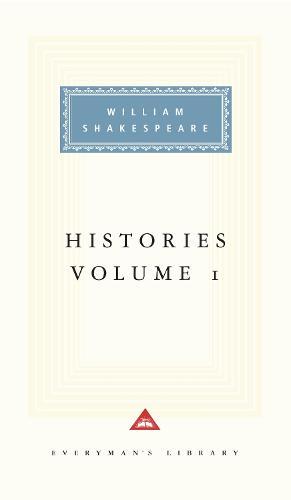Full Product Details
Author: William Shakespeare ,
Tony Tanner ,
Sylvan Barnet
Publisher: Random House USA Inc
Imprint: Everyman's Library USA
Dimensions:
Width: 13.50cm
, Height: 3.90cm
, Length: 21.20cm
Weight: 0.760kg
ISBN: 9780679433125
ISBN 10: 0679433120
Pages: 752
Publication Date: 04 October 1994
Audience:
College/higher education
,
General/trade
,
Undergraduate
,
General
Format: Hardback
Publisher's Status: Active
Availability: In Print

This item will be ordered in for you from one of our suppliers. Upon receipt, we will promptly dispatch it out to you. For in store availability, please contact us.
Reviews
It is in Shakespeare that we see history finally emerge from ritual into drama . . . Shakespeare is manifestly interested in the past as past-as different from the present . . . By exploring how we lived then, we may . . . better understand the way we live now. And-who knows?-perhaps improve it. -from the Introduction by Tony Tanner
It is in Shakespeare that we see history finally emerge from ritual into drama . . . Shakespeare is manifestly interested in the past as past--as different from the present . . . By exploring how we lived then, we may . . . better understand the way we live now. And--who knows?--perhaps improve it. --from the Introduction by Tony Tanner
It is in Shakespeare that we see history finally emerge from ritual into drama . . . Shakespeare is manifestly interested in the past as past--as different from the present . . . By exploring how we lived then, we may . . . better understand the way we live now. And--who knows?--perhaps improve it. <br>--from the Introduction by Tony Tanner
It is in Shakespeare that we see history finally emerge from ritual into drama . . . Shakespeare is manifestly interested in the past as past as different from the present . . . By exploring how we lived then, we may . . . better understand the way we live now. And who knows? perhaps improve it. from the Introduction by Tony Tanner
Author Information
William Shakespeare was born in Stratford-upon-Avon in April 1564, and his birth is traditionally celebrated on April 23. The facts of his life, known from surviving documents, are sparse. He was one of eight children born to John Shakespeare, a merchant of some standing in his community. William probably went to the King’s New School in Stratford, but he had no university education. In November 1582, at the age of eighteen, he married Anne Hathaway, eight years his senior, who was pregnant with their first child, Susanna. She was born on May 26, 1583. Twins, a boy, Hamnet ( who would die at age eleven), and a girl, Judith, were born in 1585. By 1592 Shakespeare had gone to London working as an actor and already known as a playwright. A rival dramatist, Robert Greene, referred to him as “an upstart crow, beautified with our feathers.” Shakespeare became a principal shareholder and playwright of the successful acting troupe, the Lord Chamberlain’s Men (later under James I, called the King’ s Men). In 1599 the Lord Chamberlain’s Men built and occupied the Globe Theater in Southwark near the Thames River. Here many of Shakespeare’s plays were performed by the most famous actors of his time, including Richard Burbage, Will Kempe, and Robert Armin. In addition to his 37 plays, Shakespeare had a hand in others, including Sir Thomas More and The Two Noble Kinsmen, and he wrote poems, including Venus and Adonis and The Rape of Lucrece. His 154 sonnets were published, probably without his authorization, in 1609. In 1611 or 1612 he gave up his lodgings in London and devoted more and more time to retirement in Stratford, though he continued writing such plays as The Tempest and Henry VII until about 1613. He died on April 23, 1616, and was buried in Holy Trinity Church, Stratford. No collected edition of his plays was published during his life-time, but in 1623 two members of his acting company, John Heminges and Henry Condell, put together the great collection now called the First Folio.




